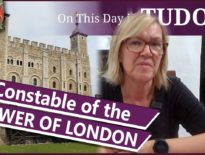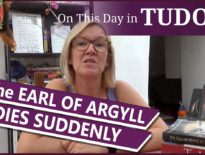On this day in Tudor history, 13th September 1503, poet and antiquary John Leland was born. Leland is known for his Latin poems and his antiquarian writings which included a defence of the history of King Arthur, which he presented to Henry VIII and his notes on his travels around England and Wales.
Leland also wrote verses for Queen Anne Boleyn's coronation procession and was a royal chaplain. He had a very sad end, though, suffering some kind of mental breakdown and going mad.
Find out more about John Leland, his life and works, in today's talk.
Also on this day in Tudor history, 13th September 1520, William Cecil, 1st Baron Burghley and Queen Elizabeth I's chief advisor, was born in Bourne in Lincolnshire. Find out more about the man Elizabeth I called her “spirit”, his court career, personal life, and his words of wisdom, in last year’s video:
Also on this day in history:
- 1544 – Death of Edward Lee, Archbishop of York. He was buried at York Minster, in the south choir aisle. Lee served Henry VIII as his almoner and a diplomat, as well as being an archbishop.
- 1557 – Death of Sir John Cheke, Tudor scholar, one time tutor to Edward VI, Secretary of State for Lady Jane Grey and the first Regius Professor of Greek at Cambridge University. He died at the home of his friend, Peter Osborne, in Wood Street, London, probably from influenza, and was buried nearby at the church of St Alban, Wood Street, in the north chapel of the chancel.
- 1596 – Death of Sir Francis Englefield, courtier, politician and pro-Spanish Catholic exile, at St Alban's College in Valladolid, Spain. He was buried in the college chapel.
- 1598 – Death of Philip II of Spain at El Escorial, near Madrid. He was buried there the next day. It is thought that he died of cancer, and he had been ill for fifty-two days.
Transcript:
On this day in Tudor history, 13th September 1503, poet and antiquary John Leland was born.
Leland is known for his Latin poems and his antiquarian writings which included a defence of the history of King Arthur, which he presented to Henry VIII; “his The laboryouse journey & serche of Johan Leylande for Englandes antiquitees”, which he also presented to the king; his biographical dictionary of British authors, a collection of excerpts from British classical and medieval texts, and his Itineraries, which recorded his travels around England and Wales.
But let me tell you a bit more about this Tudor poet…
• We know he was born on 13th September in London, due to his poetry, but the precise year is not known, although it must have been around 1503.
• He had an older brother called John. This wasn’t that unusual in Tudor times because infant mortality was high. It was obviously an important family name.
• Leland and his brother were orphaned as children and brought up by Thomas Myles. Myles sent him to be educated at St Paul’s School, a school founded in 1509 by John Colet. Scholar William Lily was his headmaster and it was at St Paul’s that Leland met William Paget, Anthony Denny, Thomas Wriothesley and Edward North, all of whom would act as his patrons later.
• After St Paul’s, Leland studied for his BA at Christ’s College, Cambridge, and was imprisoned for a time after being linked to a knight who was in contact with pretender Richard de la Pole who was in France.
• Following his release and graduation, he entered the service of Thomas Howard, 2nd Duke of Norfolk, working as tutor to his sixth son, Lord Thomas Howard.
• In 1524, the duke died and King Henry VIII sent Leland to Oxford, where he was unhappy with the conservative teaching.
• By 1528, he was in Paris working on his poetry and mixing with scholars like Jacques Lefèvre d'Etaples, Guillaume Budé and François du Bois, principal at the Collège de Tournai. He also corresponded with important men back in England, such as Cardinal Wolsey.
• Leland returned to England in 1529 and was made a royal chaplain.
• In 1533, he and Nicholas Udall wrote verses for pageants for Queen Anne Boleyn’s coronation procession.
• In 1533, the pope granted him a dispensation to hold up to four benefices so long as he took orders to become subdeacon within 2 years and priest within 7.
• According to Leland, it was also in 1533, prior to the dissolution of the monasteries, that Henry VIII “to peruse and dylygentlye to searche all the lybraryes of monasteryes and collegies” of the realm and list the books, which he did in his “Collectanea”. He was able to save some books for the royal libraries at Greenwich, Hampton Court and Westminster, and others for himself.
• At New Year 1534, Leland gave the king two books of stories and the king gave him a gilt vessel.
• In 1535, he became prebendary of Wilton Abbey.
• In the late 1530s, he became interested in English and Welsh topography, spending six years travelling around and recording his travels in notebooks. These notes were used for his work “The Itinerary”.
• In the 1530s, he also wrote a tract defending the Arthurian tradition, which was followed, in the 1540s by a longer work.
• In the 1540s, he was rector of Great Haseley in Oxfordshire, and canon and prebendary of King Henry VIII College, Oxford.
• In 1543 or 1544, Leland gave the king his work “The laboryouse journey & serche of Johan Leylande for Englandes antiquitees”, probably as a New Year’s gift. This was later published by Leland’s friend, John Bale, in 1549. The work was a record of Leland’s travels around the kingdom to preserve books.
• In 1546, the king sent him to France to bring back trees, seeds and grafts.
• In around 1547, the year of Henry VIII’s death and Edward VI’s accession, Leland had some kind of breakdown and fell into madness. In 1551, his brother John was granted custody of Leland and his property. He died on 18th April 1552 and was buried in his brother’s parish, St Michael-le-Querne. King Edward VI granted custody of Leland’s papers to Sir John Cheke, but the collection was broken up and dispersed following Cheke’s departure into exile and subsequent death. John Dee obtained several medieval manuscripts from Leland’s collection at a sale of his papers in May 1556. William Burton, a Leicestershire historian, ended up with some of Leland’s works and passed them on to the Bodleian Library
• His poetical works include a Latin elegy of Sir Thomas Wyatt the Elder; a lamentation commemorating the death of Sir Henry Dudley at Boulogne, a poem inspired by Edward VI’s birth in 1537, three poems on Henry VIII’s victories in France, and a long poem describing a river trip from Oxford to Greenwich on the Thames, in which he gave interesting topographical and historical information.
• His antiquarian work was used as primary sources for historians and antiquaries like William Harrison, William Camden, John Stow, William Dugdale, John Aubrey and Robert Plot. And his works are still used by historians today.



Leave a Reply